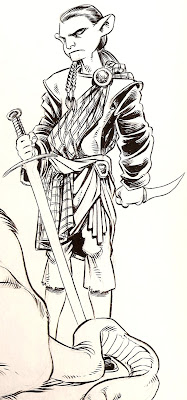
I've known Brad Thomte for twenty years, give or take. In that time he's been an Air Force zoomie, a funnybook letterer -- among other jobs he lettered the Pantheon series I did with Lone Star Press -- sales boss for a game distributer, and various other things. He was also the worst poker player in our regular Austin game, which of course made him very welcome in those poker games. But Brad liked poker and got better at it, until he won the last ever annual Austin Maverick (winner-take-all) Poker Championship. No, we didn't cancel the tournament just because Brad won it, but because all of the old gang was scattering, moving away from Austin.
Inspired primarily from the war stories I told (incessantly some complained) about my year of playing poker in Las Vegas, Brad decided to pack up the wife and the cats and the various other household vermin and move to Vegas to become a professional poker dealer. He did that, enrolled in a dealer's school, and did so well there that, upon graduation, the owner/teacher immediately made him one of the school's instructors. Eventually, with a few distractions along the way (Vegas can be a very distracting town) he became a poker dealer at a small, out-of-the-way casino.
That was just the beginning. Here's the dirty little secret about Las Vegas -- okay, one of the dirty little secrets -- The town and its chief industry (gambling of course, though they prefer to call it by the less hot-button term of gaming) is populated by something decidedly less than the brightest and best that our great nation has to offer. I won't go so far as to say that the Vegas gaming industry is staffed mostly by scoundrels, drifters, losers and self-deceiving idiots, but I could float that argument, if forced to.
Here's the typical Las Vegas Cinderella story: Melvin Dunderbum lives in Boondocks, Nebraska and hates the tedium of his life and his boring job. Mel knows that if he could just get to one of the dreams-come-true towns, he could really make something of himself. He's not quite self deceptive enough to believe he could become a movie star, if only he got himself to Hollywood, so he fixes his imagination on American dream-town numero dose: Vegas. Mel likes poker (but feel free to substitute blackjack, craps or any other standard game here) and is pretty good in his local game. He knows he could beat the system out there, not like those other losers. He gets his stake together, divorces his wife (or brings her along -- as I said, there are a million variations of this tale), packs up the twelve year old Chevrolet and heads to Vegas.
Mel checks into one of the shabby little rent-by-the-month motel rooms in the downtown area, because he's smart and doesn't plan to waste his stake on fine accommodations. There's plenty of time to move into better digs once he's made his fortune. And then, before even settling in, Mel hits the casinos and finds his poker game.
And he gets his ass handed to him -- time and time again.
In a month or two Mel has blown through his stake, losing it in increments to the compassionless, bloodthirsty sharks who ceaselessly patrol the rich hunting grounds of Vegas poker tables, looking for tourists to fleece.
At this point Mel thinks seriously about admitting defeat, packing up, tucking tail, and heading back home. In fact most Mels, or Bobs, or Wallys are just smart enough to do so. But our particular Mel isn't beaten yet. He thinks, "Okay, I was a little over my head, out of my depth, and naive when I first came out here, but now I've learned my lesson. Now I know the score. And now my poker game has gotten tight. I can win in this town, as soon as I raise another stake." See what just happened? We've just seen the first major weeding out of the real losers and dummies from the general losers and dummies. Those that have at least a wee bit of sense have gone home. The rest stay.
So now Mel hits on a plan. "Why am I paying good money to stay in a motel room, when I have a perfectly good twelve year old Chevrolet to sleep in? That saves me enough money to put a second stake together, and now that I finally know how to play this game, I'm surely going to make it here now." So Mel checks out of his shabby motel room, starts sleeping in his car, and hits the tables again.
And he loses his ass again.
And now we go through our second round of weeding out, this time separating the truly incandescent dummies and losers from the merely great dummies and losers. A new round of defeated dreamers finally admit defeat and slink home at this point. But our Mel is more intrepid than that. "Okay," he says, "It was hard won knowledge, but I've finally figured out this game. All I need is one last stake to make my third and final go at the tables."
So Mel sells his twelve year old Chevrolet to one of the many scavenger "Get instant cash for your car!" car lots that populate the most desperate areas of this town, like the uncountable packs of jackals that shadow any herd of tasty meat animals. He has one last small stake of cash and this time he really knows what he's doing.
And you know what happens. He loses it again.
And now poor Mel is homeless and broke. Does he go home now, at long last? No way. He gets a nowhere job -- perhaps as a night security guard for the same shabby motel he can no longer afford to live in -- and slowly builds up another stake. But this time he uses the money to enter one of the fairly inexpensive dealing schools in town. This time he decides to become a poker (or blackjack or craps or whatever) dealer, so that, even though he's acknowledged by this point that he's a no good degenerate gambler, he can still participate in the great game, and from time to time still play in it.
And that, my friends, is the talent pool that the Las Vegas gaming industry draws upon to run the great machine. They aren't exactly the cream of the crop. Is this a gross generalization? Of course it is. Any generalization is by definition wrong in many particulars. But keep this in mind: During my year in Vegas, to see if I could actually make it as a professional poker player, the most common excuse I heard for a dealer not being able to make it to his assigned shift was, "I couldn't make bail last night."
This is what I communicated to the boys and girls back in Austin, following my year in Vegas, "It's such a pool of morons out there, that anyone with even halfway competent skills and a reasonable work ethic will rise up through the ranks and run that town in a year or two."
And Brad Thomte, to get back to the subject of this essay, was more than halfway competent and his work ethic is just fine -- much better than mine for the most part.
Starting as a lowly extra-board dealer for one of the smallest poker rooms in the city, Brad steadily rose through the ranks, with a few distractions along the way (this can be a very distracting town), until now, as of December 1, 2008, Brad runs the most prestigious poker room in Las Vegas. Brad has just been made poker room manager (that's above the level of pit boss) of Binions, which is the universally-acknowledged long-time king of poker in Vegas, and therefore in the world. Binions is the place that started the World Poker Series and it's the one place that still gets calls in the middle of the night from folks in Norway and Singapore and Vladivostok to make an official ruling on some disputed action in their home games.
Basically Brad runs poker in the world.
He's done some other things, and had some other accomplishments of note, such as being one of the on-air personalities of the Ultimate Poker Challenge, one of the many TV poker shows that haunted every up-the-channel station for a time. And some of you will also recognize Brad as the model for Fables' own Bluebeard. Brad is determined to land the role of Bluebeard, if and when a Fables TV series is ever produced. But all of that pales compared to the fact that he now runs the Binions poker room.
Basically Brad runs poker in the world.
And that is just one of the reasons why my friend Brad is not only not another poor Mel Dunderbum, but he's also a truly a Fine Fellow.

 It started snowing here in Las Vegas mid afternoon today and it's been going strong all day. By 3 PM there was enough to make a good snowball. By 6 there was enough accumulation to build a snowman. By morning we should have a good six to eight inches of it on the Strip.
It started snowing here in Las Vegas mid afternoon today and it's been going strong all day. By 3 PM there was enough to make a good snowball. By 6 there was enough accumulation to build a snowman. By morning we should have a good six to eight inches of it on the Strip.
 Of course this only further proves what our top (non-politically aligned) scientists, like Al Gore, have been saying all along. Man caused global warming is about to crush human civilization for all time and at last rescue our long dying planet from the pestilence of our infestation. If only we'd gone socialist sooner. Thank Gaea our financial crisis has wrested our top industries out of greedy capitalists hands and forced a sane legislature to start nationalizing everything.
Of course this only further proves what our top (non-politically aligned) scientists, like Al Gore, have been saying all along. Man caused global warming is about to crush human civilization for all time and at last rescue our long dying planet from the pestilence of our infestation. If only we'd gone socialist sooner. Thank Gaea our financial crisis has wrested our top industries out of greedy capitalists hands and forced a sane legislature to start nationalizing everything.













